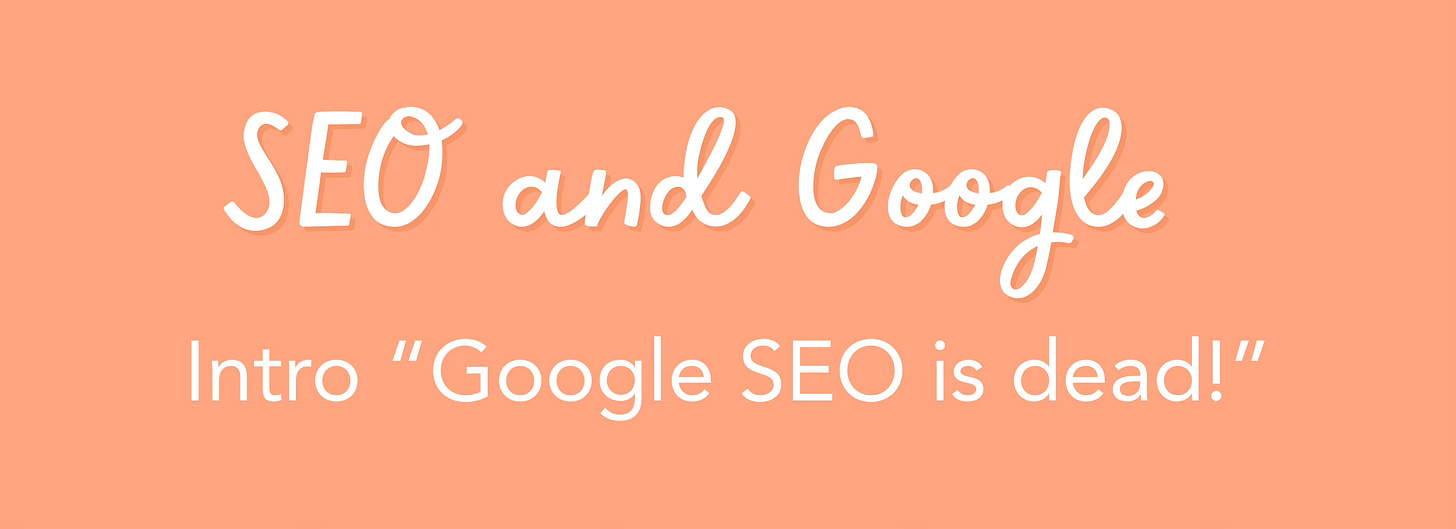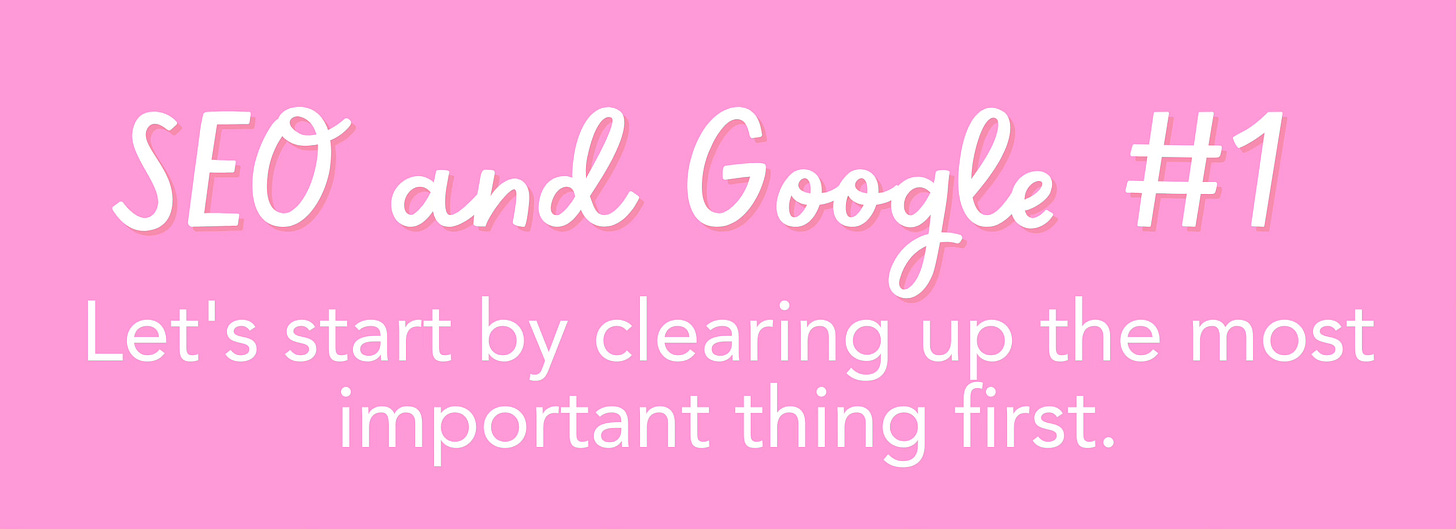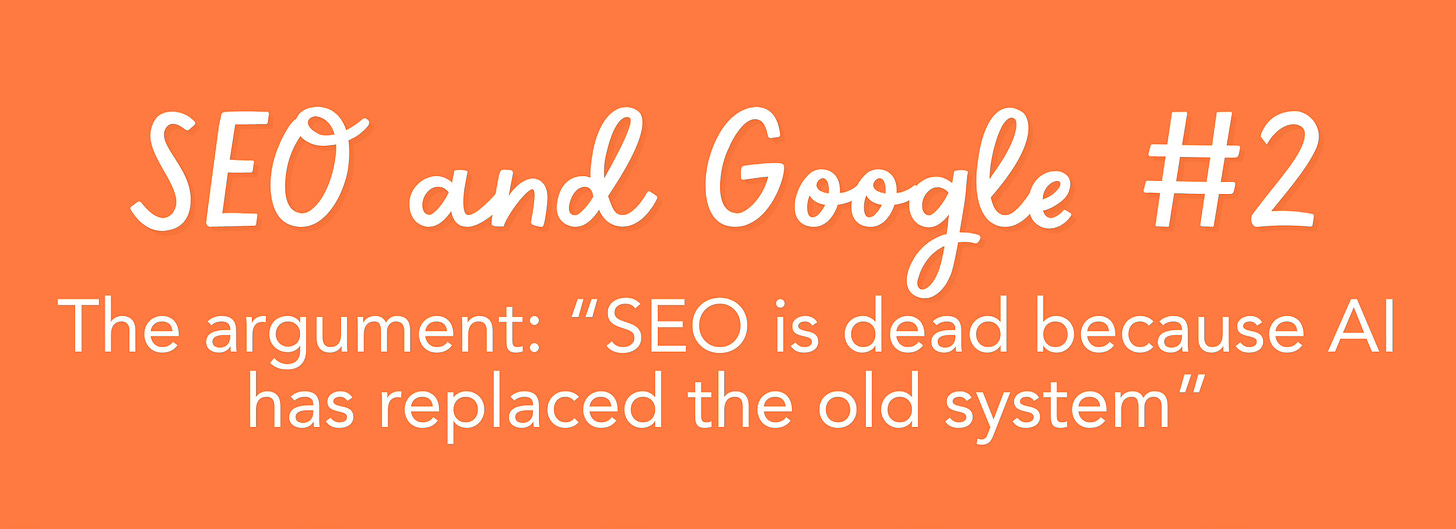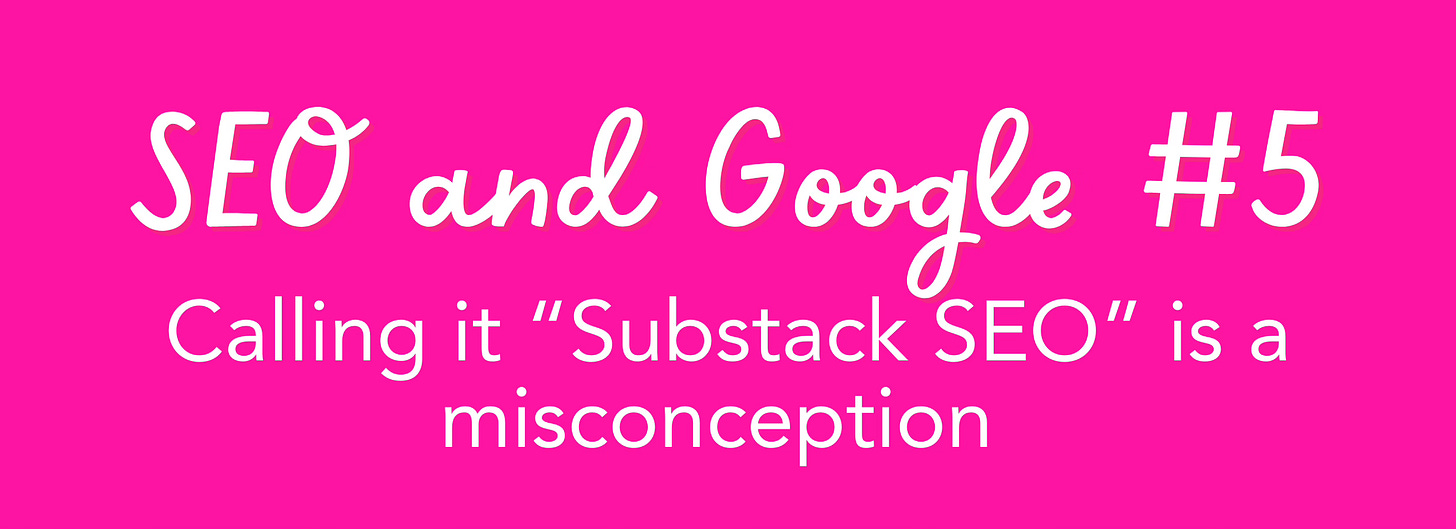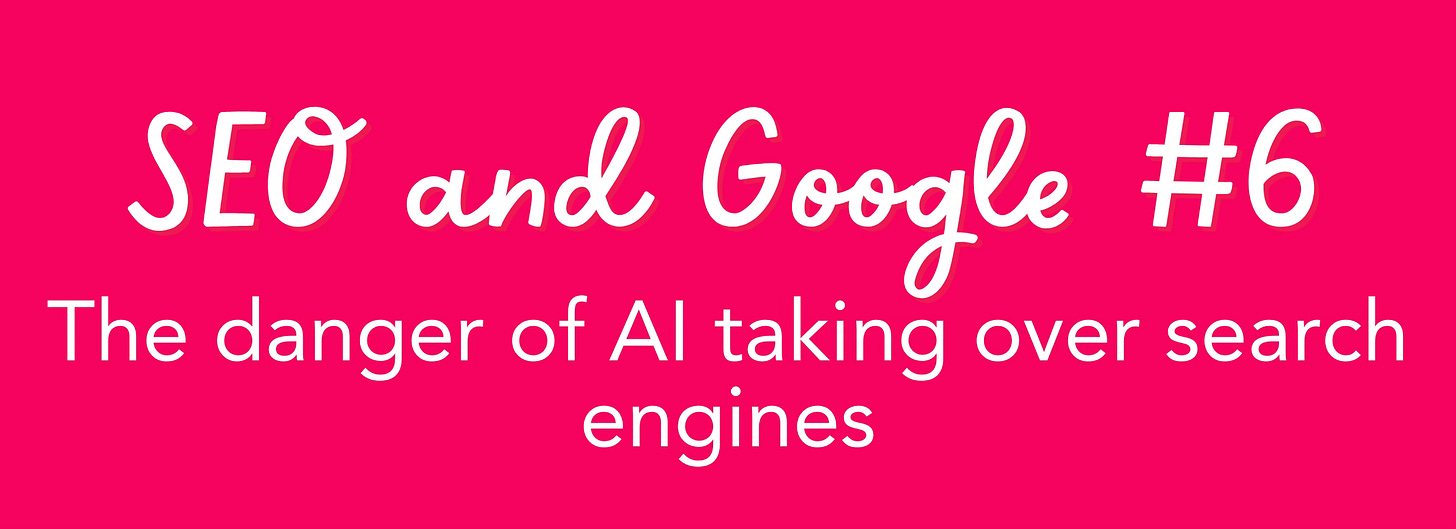“Google SEO is dead! And if you hear someone talking about it, just walk away. It never mattered on Substack, anyway!”
That’s Simply Not True—Let Me Explain Why
Content of this post:
Intro “Google SEO is dead!”
#1 Let's start by clearing up the most important thing first
#2 The argument: “SEO is dead because AI has replaced the old system”
# 3 Why your Google search results might look different from someone else’s
#4 "SEO never mattered on Substack, anyway!" is a false assumption
#5 Calling it “Substack SEO” is a misconception
#6 The Danger of AI taking over search engines
#7 Why it's essential to get your Substack posts indexed on Google
Intro “Google SEO is dead!”
You’ve probably heard it before.
I get it. SEO has always had that tech-bro, keyword-stuffing vibe — and let’s be honest, on platforms like Substack, it sometimes feels irrelevant. After all, most of our traffic comes from email, shares, or loyal readers…
Or is that perhaps not the case here?
I listened to the following on one of the newsletters I subscribed to (Actually, I watched a video on that newsletter site about using an AI tool and Google SEO):
“Google SEO is dead! I got so sick of hearing about SEO, and I never cared about it anyway. It never mattered on Substack, anyway!”
I could leave it there, but the claim isn't accurate. As with many things today, it comes down to the difference between objective facts and personal feelings.
I feel that it is essential to mention that I am not saying anything about the person whose statement I am writing about in this article. She is a sweet, cheerful woman who helps other writers find their space and voice on Substack. The tech stuff she talks about in her video just isn’t right. And she even admits it – she says, 'I didn’t care,' which means, 'I have no idea,' and this is more based on personal feelings than objective facts.
I want to examine her statement in this article. Come along, and let’s do so together.
But before that, I would like to invite you to subscribe to my newsletter 💡5-MINUTE DIGITAL HACKS. 🚀 for Writers, Creators & Artists:
If SEO still feels like a book with seven seals, feel free to sign up for my other newsletter, 5-Minute Digital Hacks. I’m relaunching it on April 20 — and yes, SEO will be one of the topics!
#1 Let's start by clearing up the most important thing first
✅ Why SEO Isn’t Dead:
➔ Google and other platforms are still search engines.
Even with AI overlays (like Google SGE or Bing with ChatGPT), they rely on structured content, keywords, and clean website architecture to deliver good answers.➔ AI models learn from SEO data!
They scan billions of websites for metadata, titles, structure, and keywords—all SEO. The cleaner your content, the better AI will understand and cite it.➔ No SEO, no visibility.
Whether it’s a blog, e-book, or Substack, you want people to find you. SEO is your path to visibility.
#2 The argument: “SEO is dead because AI has replaced the old system”
This opinion often rests on a few observations:
AI Overviews now appear above traditional results
That’s real — Google's new Search Generative Experience (SGE)does show AI-generated summaries above the usual top links. It lowers the visibility of what we used to call the “coveted top 10” results.➔ In the SEO context, it refers to the top 10 rankings on the first page of Google search results – the positions everyone aims for because they offer the most visibility and the highest click-through rates.
If your article made the first page, you made it with your content. Simple as that.
Google results are personalized.
Google tailors results based on your location, past searches, and browsing behavior.Google crawls the web and generates summaries
Google uses crawled data (including from Substack!) to generate these new overviews and suggested answers. But crawling is nothing new; only developing the summaries is.
But here’s what’s not true:
Google SEO is not dead.
It’s changing. Google still relies on structured, crawlable, high-quality content to fuel its results and summaries, especially for AI Overviews.SEO does matter on Substack – if your posts are public.
Google indexes Substack posts. Your post title, subtitle, custom URL, and intro paragraph affect whether and how your content appears in search results. If someone Googles a topic you’ve written about, your Substack can show up — and often does. Actually, I am surprised at how quickly some posts rank on Google.Search is still how many readers find content.
Even on Substack, many creators report traffic from Google, especially for evergreen or well-structured posts.
#3 Why your Google search results might look different from someone else’s
You and someone else might search for the same thing on Google but have slightly different results. Why? Google tailors its results based on timing, context, and personalization.
⏱️ Timing: One of the Biggest Factors
The timing of your search can significantly affect what you see—Google indexes new content from across the web, sometimes just minutes after publication. So if two people search the exact phrase just minutes or hours apart, they might see different results simply because newer content has become available.
Another factor is the rollout of updates. Google operates through data centers all over the world. When ranking system updates are made, they don’t reach all data centers simultaneously. Depending on which data center handles your search, the results may vary.
🌍 Context: Making Search More Relevant
Google also takes context into account to provide more relevant results. Here are a few ways that work:
Location: Searching for “pizza” in Berlin vs. New York gives different results tailored to your location.
Language: Results are prioritized in the language you speak.
Device Type: Searches on mobile may highlight app links or show content best suited for smaller screens.
Browsing Behavior: If you click on a result and then return to the search page, Google may suggest more similar or related content.
Do you feel overwhelmed by everything I'm writing here? If so, maybe you'd like to subscribe to my newsletter instead.
#4 "SEO never mattered on Substack, anyway!" is a false assumption
Where do people think their readers come from? It’s not like a million new readers magically appear on Substack overnight.
They come from search engines like Google, because they were researching a specific topic and happened to come across a Substack post.
That’s actually how I discovered Substack in the first place!
Yes, some have come to Substack because they transferred with the writer they followed from another platform, or they had subscribed to a writer or creator’s newsletter on any social media platform or even the writer’s website.
But even then, there's a good chance they came across the content through a Google search or another search engine.
Substack content can and must be indexed by search engines
Unless a post is paywalled or the entire publication is private, Substack content is publicly accessible and indexed by Google. That means:
Headlines, subheadings, and keywords can appear in search results.
People can discover your Substack via search, mainly if you write on niche or timely topics.
So yes, SEO does matter, even if it's not the primary discovery method for most readers.
SEO matters more over time
Substack’s built-in network and email list are key for early traction. But SEO becomes crucial for long-term discoverability, especially for evergreen content (like tutorials, reviews, and essays).
You don’t need to go full “SEO mode,” but the basics help
A clear headline with relevant keywords
Descriptive meta text (first paragraph or excerpt)
Clean formatting and readable structure (with headers and bullet points)
These little things help Google understand and rank your post and don’t compromise authenticity or voice.
"Substack SEO" can be misleading because SEO (Search Engine Optimization) traditionally refers to optimizing your content for external search engines like Google. When someone types in a related keyword, you’re trying to get your article, blog, or product to appear on page one.
On Substack, the following applies:
Substack is not indexed as profoundly or broadly as blogs on standalone websites.
Substack’s internal search is limited, slow to update, and not algorithmically ranked in the same way Google works.
Discoverability on Substack relies more on recommendations, Restacks, social sharing, and direct subscriber relationships than on search.
So while you can and should optimize your headlines, tags, and post URLs to improve visibility on Google or social platforms, calling it “Substack SEO” is like saying “Instagram SEO.” It blurs the line between content visibility strategy and actual search engine optimization.
#6 The danger of AI taking over search
As AI increasingly shapes how we search for information, there's growing concern about what happens when algorithms—not humans—control what we see.
When AI dominates search engines, it can narrow our perspectives by filtering content based on predicted preferences, not diverse viewpoints. It may prioritize engagement over accuracy, and smaller creators or independent voices risk being buried beneath optimized content.
The danger lies not just in misinformation but also in losing access to the rich, varied web that made the Internet valuable in the first place.
I sometimes use ChatGPT to search for information, but I must be extremely cautious. For instance, when I wrote an article in German about politics, I noticed that AI presented me with information from sources that weren't reliable or citable. Since this is such an important issue, I plan to write more articles on this topic.
#7 Why it's essential to get your Substack posts indexed on Google
If you're putting your heart, soul, and expertise into your Substack newsletter, you want it to reach more than just your current subscribers. Getting your Substack posts indexed by Google is one of the most innovative ways to increase your reach, grow your audience, and make your content work for you long-term.
Why Indexing Matters
1. Discoverability: If Google doesn't index your posts, they won't appear in search results — ever. That means potential readers searching for precisely what you're writing about will never find you. Being indexed ensures your content can show up when people Google keywords related to your topics.
2. Evergreen traffic: Once your Substack posts are indexed, they can attract readers months or even years after you publish them. Instead of relying solely on newsletter subscribers or social shares, your content becomes part of a more extensive web of searchable information.
3. Authority & credibility: Google indexing can boost your credibility. If someone Googles your name or a topic you write about and your Substack appears on the first page, that builds trust and authority in your niche.
Do you feel overwhelmed by everything I'm writing here? Maybe you'd like to come over to my newsletter instead. Learn anything there is to know about SEO!
You might like to read the following post:
If you like you can subscribe to my newletter💡5-MINUTE DIGITAL HACKS. 🚀 for Writers, Creators & Artists:
If SEO still feels like a book with seven seals, please sign up for my other newsletter, 5-Minute Digital Hacks. I’m relaunching it on April 20 — and yes, SEO will be one of the topics!
You can also join me on my newsletter ✳be bold. take charge. embrace life:
Cheers,
SILKE KRISTIN ❁
✳ be bold. take charge. embrace life. by ❁SILKE KRISTIN JUELICH❁





